Social Media Harm in Teenagers
- Last Updated: June 18th, 2025

Attorney Jessica Paluch-Hoerman, founder of TruLaw, has over 28 years of experience as a personal injury and mass tort attorney, and previously worked as an international tax attorney at Deloitte. Jessie collaborates with attorneys nationwide — enabling her to share reliable, up-to-date legal information with our readers.
Legally Reviewed
This article has been written and reviewed for legal accuracy and clarity by the team of writers and legal experts at TruLaw and is as accurate as possible. This content should not be taken as legal advice from an attorney. If you would like to learn more about our owner and experienced injury lawyer, Jessie Paluch, you can do so here.
Fact-Checked
TruLaw does everything possible to make sure the information in this article is up to date and accurate. If you need specific legal advice about your case, contact us by using the chat on the bottom of this page. This article should not be taken as advice from an attorney.
Key takeaways:
- Many teenagers, about 35%, are checking social media several times a day, which can lead to mental health issues like anxiety and depression.
- Excessive use of social media in teens is linked with poor sleep quality, body image issues, and cyberbullying experiences.
- Parents play a crucial role by setting screen time limits, monitoring online activity, and encouraging open discussions about the challenges of social media.
Social Media Harm in Teenagers
On this page, we’ll discuss an overview of social media harm in teenagers, negative impact of social media harm on youth mental health, adolescence coping strategies for social media harm, and much more.
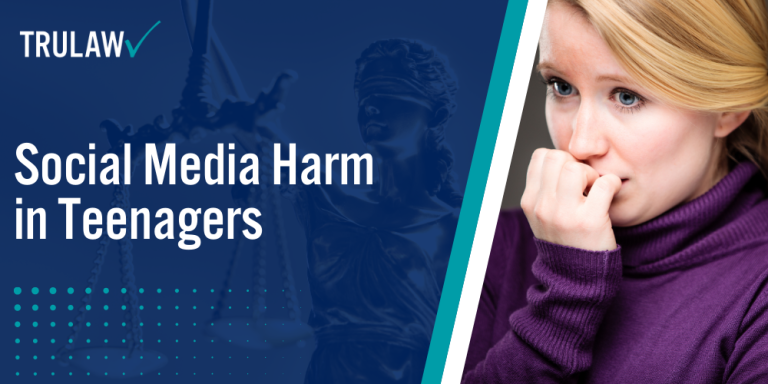
Intro to Social Media Harm
Here are some key concerns associated with social media harm outlined by the Pew Research Center:
- The impact of online interactions on mental health.
- The prevalence of cyberbullying and its consequences.
- The spread of misinformation and its societal repercussions.
- Privacy breaches and data security on social media platforms.
If you or a loved one has faced mental health issues due to social media harm, you may be eligible to pursue compensation.
Reach out to TruLaw via the chat feature on this page to determine if you qualify to participate in a lawsuit concerning the harm caused by Snapchat.
Table of Contents
Negative Impact of Social Media on Youth Mental Health
Social media’s influence has been linked to various negative mental health outcomes among young people.
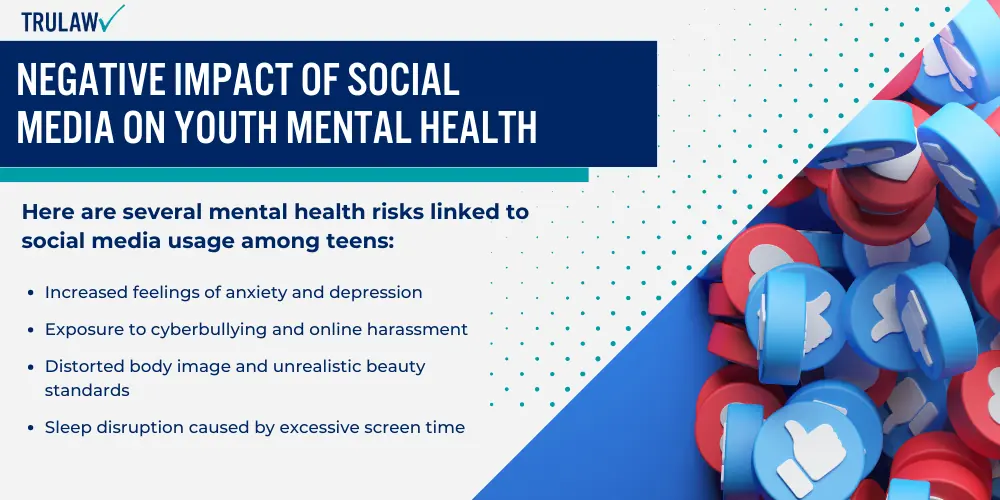
Multiple studies and observations suggest that social media use can contribute to poor mental health in youth.
Teens & Social Media: Exploring Mental Health Risks
Young people are particularly vulnerable to mental health risks associated with social media due to their developing emotional and social skills.
Here are several mental health risks linked to social media usage among teens:
- Increased feelings of anxiety and depression
- Exposure to cyberbullying and online harassment
- Distorted body image and unrealistic beauty standards
- Sleep disruption caused by excessive screen time
Case Studies: Social Media’s Impact on Teen Mental Health
Research has provided insight into how social media can affect young people’s mental health.
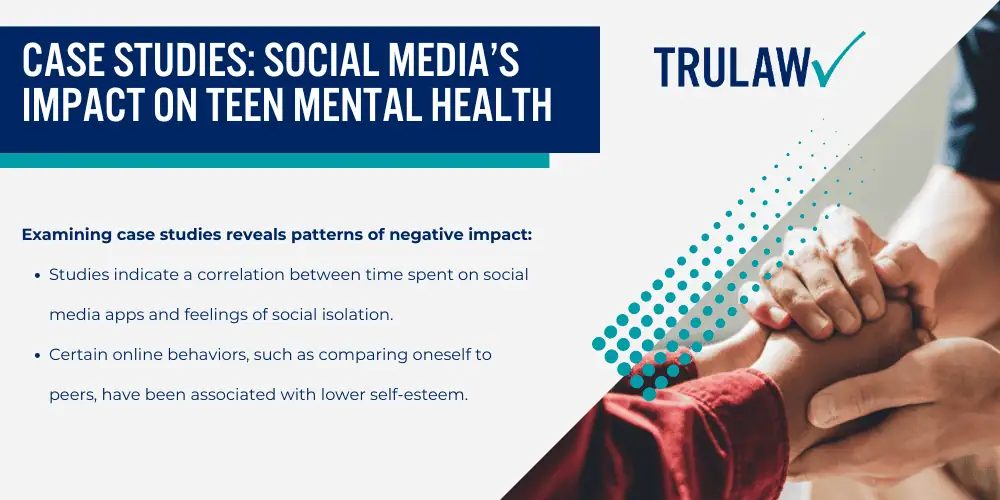
Examining case studies reveals patterns of negative impact:
- Studies indicate a correlation between time spent on social media apps and feelings of social isolation.
- Certain online behaviors, such as comparing oneself to peers, have been associated with lower self-esteem.
Social Media Addiction and Its Risks
Social media addiction is emerging as a serious problem with possible long-term implications for youth mental health.
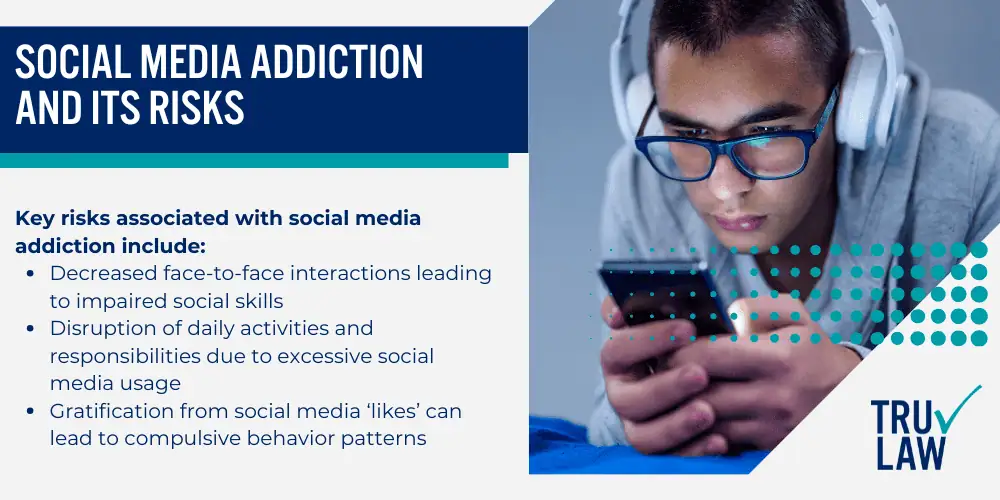
Key risks associated with social media addiction include:
- Decreased face-to-face interactions leading to impaired social skills
- Disruption of daily activities and responsibilities due to excessive social media usage
- Gratification from social media ‘likes’ can lead to compulsive behavior patterns
How Social Media Can Influence Adolescent Development
Social media platforms are deeply woven into the fabric of modern adolescent life, with significant effects on mental health conditions and personal growth.
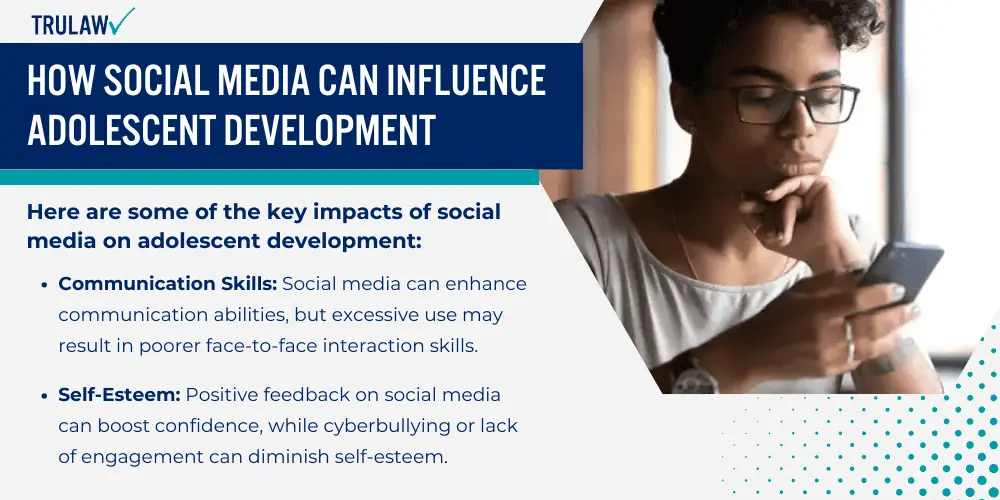
Adolescent Development and Social Media Impact
The intersection of adolescent development and social media impact is marked by both opportunities and challenges.
Adolescents access social media to connect with peers, but these social media habits can also affect their emotional and psychological development.
Here are some of the key impacts of social media on adolescent development:
- Communication Skills: Social media can enhance communication abilities, but excessive use may result in poorer face-to-face interaction skills.
- Self-Esteem: Positive feedback on social media can boost confidence, while cyberbullying or lack of engagement can diminish self-esteem.
Social Media and Eating Disorders in Teens
Social media contributes to the shaping of body image perceptions among adolescent girls and boys, potentially leading to disordered eating behaviors.
Here are some ways social media can contribute to eating disorders in teens:
- Body Image: Exposure to idealized body standards can create dissatisfaction and body image concerns.
- Dieting Trends: Social media often promotes extreme dieting trends that can influence teens to engage in harmful dietary behaviors.
Public Health Advisory on Teen Social Media Use
The Surgeon General’s advisory has pointed out the potential for mental health problems arising from teen social media use, prompting public health advisories and guidelines.
Here are some key recommendations from public health advisories:
- Screen Time Recommendations: Advisories often include recommended limits on screen time, promoting healthier social media habits.
- Parental Involvement: They stress active parental involvement in monitoring and guiding teen’s social media activity.
Social Media's Effects on Emotional and Physical Health
The intersection of social media usage and health extends significantly into the emotional and physical realms, impacting parameters such as sleep quality, mood disorders, and real-life interaction.
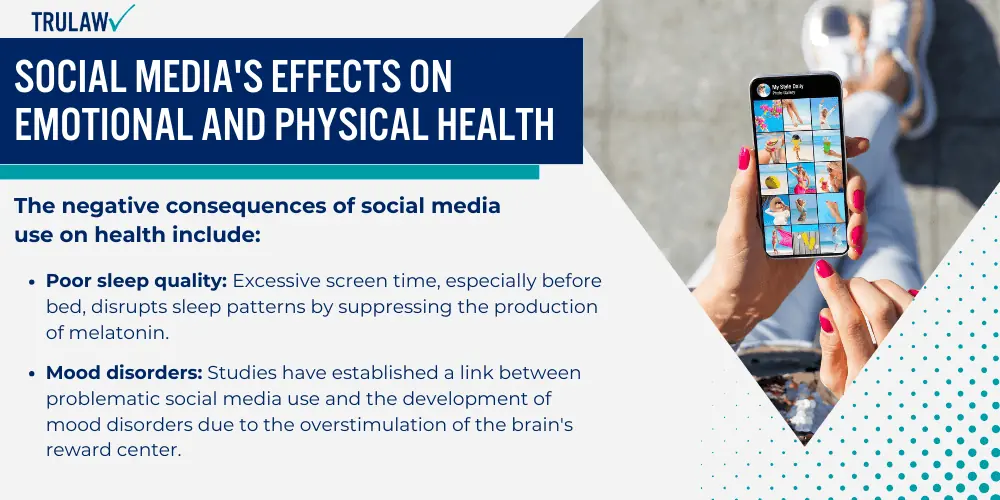
Correlation with Sleep Quality and Mood Disorders
Social media’s interference with sleep quality is a well-documented phenomenon.
It can lead to sleep difficulties, which in turn affect overall health outcomes.
The negative consequences of social media use on health include:
- Poor sleep quality: Excessive screen time, especially before bed, disrupts sleep patterns by suppressing the production of melatonin.
- Mood disorders: Studies have established a link between problematic social media use and the development of mood disorders due to the overstimulation of the brain’s reward center.
Impact on Emotional Health and Real-Life Interactions
The emotional health of social media users is often influenced by their online experiences, potentially leading to a rise in feelings of social anxiety and hindering interactions in real life.
Here’s how social media can negatively impact users:
- Emotional health: Constant exposure to idealized versions of others’ lives may elevate feelings of inadequacy or dissatisfaction with one’s own life.
- Real-life interactions: Heavy social media use can substitute or impede valuable face-to-face interactions, which are essential for maintaining good emotional health and social skills.
Statistics on Social Media Use
Data on social media use offers insights into its widespread engagement and the prevalence of its effects on various aspects of physical and emotional well-being.
Some key findings on how social media use can impact health include:
- Emotional health: A substantial percentage of teens report feelings of sadness or depression linked to social media comparisons.
- Physical activity: There is a negative correlation between time spent on social media and engagement in physical activities, which is crucial for maintaining good physical health.
Promoting Safety for Teen Social Media Use and Well-Being
The rise of social media has magnified the importance of teaching teens to cultivate safe online practices for their well-being.
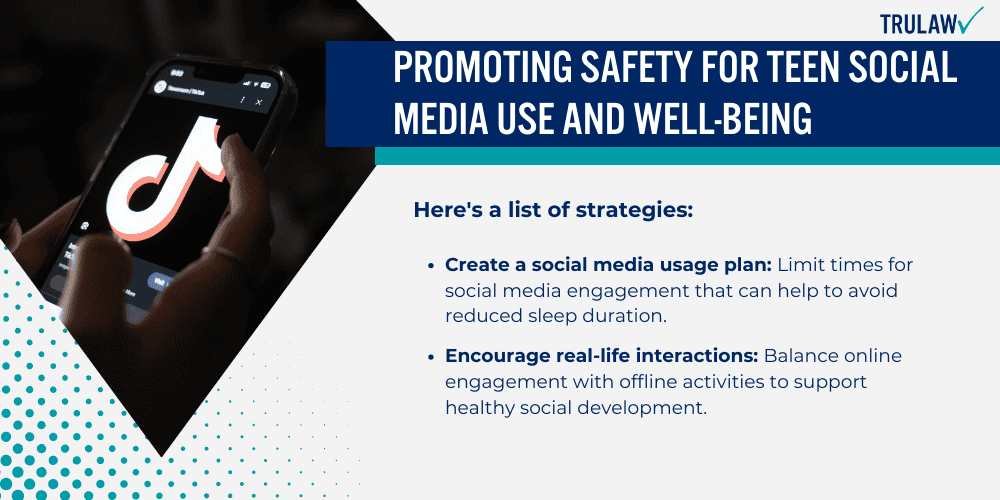
By addressing social media’s effects, setting ground rules, and acknowledging both negative and positive aspects, caregivers can guide adolescents toward a more balanced digital world experience.
Building Healthy Social Media Habits for Teenagers
Healthy social media habits are foundational for safeguarding adolescents’ well-being.
They play a pivotal role in mitigating negative feelings and promoting positive interactions online.
Here’s a list of strategies:
- Create a social media usage plan: Limit times for social media engagement that can help to avoid reduced sleep duration.
- Encourage real-life interactions: Balance online engagement with offline activities to support healthy social development.
Influence on Body Image and Self-Esteem
Social media can have a profound impact on body image and self-esteem.
Young adults often compare themselves to the curated images they see online, which can create negative feelings.
How to address these challenges:
- Promote media literacy: Teach kids how to assess and understand the curated nature of online content critically.
- Encourage positive content: Highlight and engage with social media accounts that promote positive body image and self-esteem.
Protection Mechanisms Against Online Abuse
Online abuse is a significant concern within the digital world.
It’s essential to equip teens with tools to protect themselves and to know when to seek help during tough times.
In this regard:
- Implement privacy controls: Use social media app settings to manage who can view and interact with teens’ content.
- Establish reporting procedures: Teach kids how to report instances of online abuse and who they can turn to for support.
Adolescence Coping Strategies for Social Media Harm
Adolescents today often face challenges posed by excessive social media use, which can impact their self-worth and self-esteem.
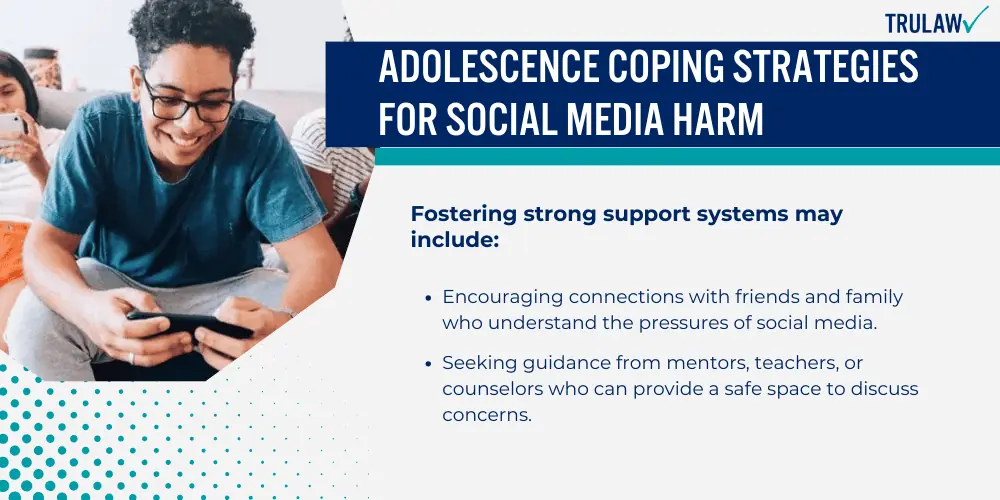
This section explores practical strategies that help adolescents to manage the potential harm caused by social media.
Fostering Support Systems and Seeking Professional Help
Social support is a vital part of helping adolescents navigate the stresses associated with social media.
Fostering strong support systems may include:
- Encouraging connections with friends and family who understand the pressures of social media.
- Seeking guidance from mentors, teachers, or counselors who can provide a safe space to discuss concerns.
For issues such as low self-esteem and impulse control, adolescents may benefit from:
- Professional counseling to develop healthier coping mechanisms.
- Support groups where they can share experiences and solutions in a moderated setting.
Mindfulness and Self-Care in the Age of Social Media
While social media offers connection and information, it can also be overwhelming.
To navigate the digital world with ease, prioritize your well-being by incorporating mindfulness and self-care strategies into your routine.
In dealing with negative posts and the barrage of digital content, practice mindfulness and self-care strategies include, but are not limited to:
- Engaging in regular digital detoxes to create a balance between online and offline activities.
- Setting aside time for activities that boost self-esteem and promote a sense of accomplishment.
- Establish screen time limits to prevent excessive social media use.
- Create a routine for daily mindfulness exercises such as meditation or journaling to manage stress.
Response to Youth Mental Health Crisis: Social Media Harm
In addressing the mental health crisis among youth, it’s essential to consider the impact of social media harm and the strategies employed to mitigate it.
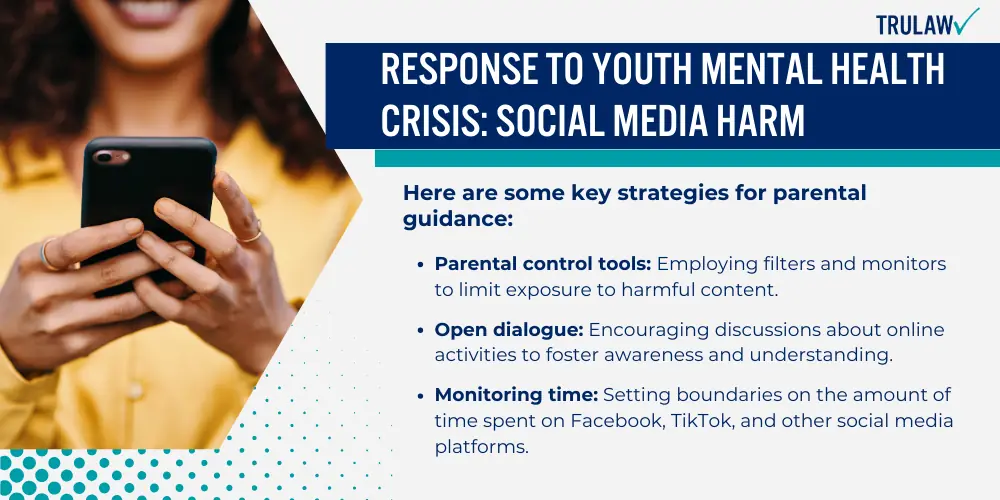
This includes the roles of parental guidance and educational initiatives in moderating a child’s social media consumption and promoting adolescent health.
Parental Guidance and Child’s Media Consumption
Parents play a key role in supervising and influencing their child’s engagement with social media.
This supervision is intended to prevent negative outcomes such as self-harm, particularly among teenage girls who are active on social platforms.
Here are some key strategies for parental guidance:
- Parental control tools: Employing filters and monitors to limit exposure to harmful content.
- Open dialogue: Encouraging discussions about online activities to foster awareness and understanding.
- Monitoring time: Setting boundaries on the amount of time spent on Facebook, TikTok, and other social media platforms.
- Promoting positive content: Guiding children towards profiles and groups that align with similar interests and have a beneficial impact.
Educational Initiatives and Adolescent Health
Schools and educational bodies are collaborating with experts to integrate mental health education into their curricula.
These programs aim to equip adolescents with the tools to use social media safely.
To promote responsible social media use, schools can implement a variety of educational initiatives:
- Workshops and seminars: Organizing interactive sessions led by trained human services professionals.
- Collaboration with experts: Involving associate professors and specialists in the development of educational materials and programs.
- Critical media literacy: Teaching students to analyze and question the media they consume.
- Support groups: Creating student-led forums for sharing experiences and strategies for healthy media consumption.
Social Media Harm Lawsuits Frequently Asked Questions
-
What are the potential psychological impacts of social media harm?
Social media harm can have various psychological impacts on individuals.
It can lead to increased levels of anxiety and depression, as well as a distorted sense of reality due to curated online personas.
-
What statistical evidence is there to suggest social media can be harmful?
Researchers have gathered statistical evidence demonstrating a correlation between social media usage and negative mental health outcomes.
Studies indicate that increased screen time is associated with heightened anxiety and depression symptoms, particularly in young people.
-
How can social media usage negatively affect teenagers?
Social media consumption among teenagers can have various adverse effects, particularly on self-esteem and body image.
They are at risk of online bullying, which can lead to mental health issues such as anxiety and depression.
-
What are some of the risks associated with social media use?
There are several risks associated with using social media, such as privacy breaches and exposure to misinformation.
Users may face cyberbullying and develop unrealistic perceptions of others’ lives, leading to psychological distress.
-
How does social media consumption influence mental health?
Social media consumption can have a negative impact on mental health in various ways.
It can disrupt sleep patterns due to late-night screen time and cause emotional strain from online interactions, leading to perceived social isolation.

Managing Attorney & Owner
With over 25 years of legal experience, Jessica Paluch-Hoerman is an Illinois lawyer, a CPA, and a mother of three. She spent the first decade of her career working as an international tax attorney at Deloitte.
In 2009, Jessie co-founded her own law firm with her husband – which has scaled to over 30 employees since its conception.
In 2016, Jessie founded TruLaw, which allows her to collaborate with attorneys and legal experts across the United States on a daily basis. This hypervaluable network of experts is what enables her to share the most reliable, accurate, and up-to-date legal information with our readers!
Additional Social Media Harm Lawsuits resources on our website:
Here, at TruLaw, we’re committed to helping victims get the justice they deserve.
Alongside our partner law firms, we have successfully collected over $3 Billion in verdicts and settlements on behalf of injured individuals.
Would you like our help?
At TruLaw, we fiercely combat corporations that endanger individuals’ well-being. If you’ve suffered injuries and believe these well-funded entities should be held accountable, we’re here for you.
With TruLaw, you gain access to successful and seasoned lawyers who maximize your chances of success. Our lawyers invest in you—they do not receive a dime until your lawsuit reaches a successful resolution!
AFFF Lawsuit claims are being filed against manufacturers of aqueous film-forming foam (AFFF), commonly used in firefighting.
Claims allege that companies such as 3M, DuPont, and Tyco Fire Products failed to adequately warn users about the potential dangers of AFFF exposure — including increased risks of various cancers and diseases.
Depo Provera Lawsuit claims are being filed by individuals who allege they developed meningioma (a type of brain tumor) after receiving Depo-Provera birth control injections.
A 2024 study found that women using Depo-Provera for at least 1 year are five times more likely to develop meningioma brain tumors compared to those not using the drug.
Suboxone Tooth Decay Lawsuit claims are being filed against Indivior, the manufacturer of Suboxone, a medication used to treat opioid addiction.
Claims allege that Indivior failed to adequately warn users about the potential dangers of severe tooth decay and dental injuries associated with Suboxone’s sublingual film version.
Social Media Harm Lawsuits are being filed against social media companies for allegedly causing mental health issues in children and teens.
Claims allege that companies like Meta, Google, ByteDance, and Snap designed addictive platforms that led to anxiety, depression, and other mental health issues without adequately warning users or parents.
Transvaginal Mesh Lawsuits are being filed against manufacturers of transvaginal mesh products used to treat pelvic organ prolapse (POP) and stress urinary incontinence (SUI).
Claims allege that companies like Ethicon, C.R. Bard, and Boston Scientific failed to adequately warn about potential dangers — including erosion, pain, and infection.
Bair Hugger Warming Blanket Lawsuits involve claims against 3M — alleging their surgical warming blankets caused severe infections and complications (particularly in hip and knee replacement surgeries).
Plaintiffs claim 3M failed to warn about potential risks — despite knowing about increased risk of deep joint infections since 2011.
Baby Formula NEC Lawsuit claims are being filed against manufacturers of cow’s milk-based baby formula products.
Claims allege that companies like Abbott Laboratories (Similac) and Mead Johnson & Company (Enfamil) failed to warn about the increased risk of necrotizing enterocolitis (NEC) in premature infants.
Here, at TruLaw, we’re committed to helping victims get the justice they deserve.
Alongside our partner law firms, we have successfully collected over $3 Billion in verdicts and settlements on behalf of injured individuals.
Would you like our help?
